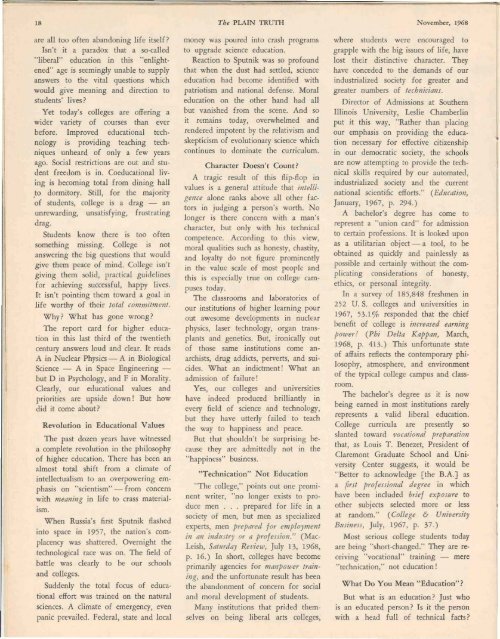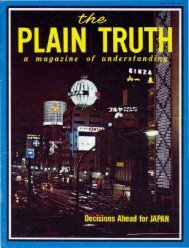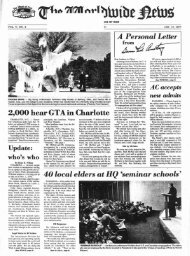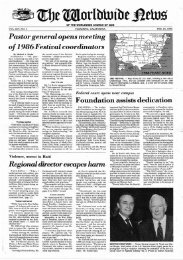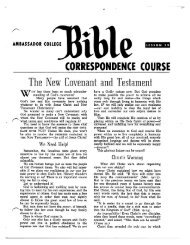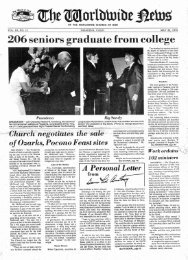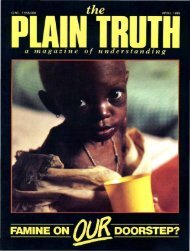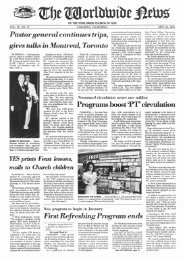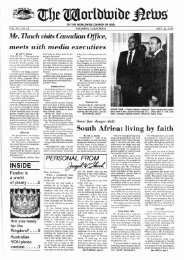The Generation Gap-WHY? - Herbert W. Armstrong
The Generation Gap-WHY? - Herbert W. Armstrong
The Generation Gap-WHY? - Herbert W. Armstrong
You also want an ePaper? Increase the reach of your titles
YUMPU automatically turns print PDFs into web optimized ePapers that Google loves.
18<br />
are all too often abandoning lif e itself?<br />
Isn' t it a para dox that a so-called<br />
"liberal" education in this "enlightened"<br />
age is seemingly unable to supply<br />
answers to the vital questions which<br />
would give meaning and direction to<br />
students' lives ?<br />
Yet roday's colleges are offering a<br />
wider variety of courses than ever<br />
befor e. Improved educational technology<br />
is providing teaching techniques<br />
unheard of only a few years<br />
ago. Social restrictions arc out and student<br />
freedom is in. Coeducational Iiving<br />
is becoming total from dinin g hall<br />
,to dormitory. Still, for the majority<br />
of stude nts, college is a drag - an<br />
unrewarding, unsatisfying, frustrating<br />
drag.<br />
Students know there is too often<br />
something rrussmg. College is not<br />
answering the big quest ions that would<br />
give them peace of mind. College isn't<br />
giving them solid, practical guidelines<br />
for achieving successful, happy lives.<br />
It isn't pointing them toward a goal in<br />
life worthy of their total commitment,<br />
W hy ? What has gone wro ng?<br />
<strong>The</strong> report card for high er education<br />
in this last third of the twentieth<br />
century answers loud and clear. It reads<br />
A in Nuclear Physics - A in Biological<br />
Science - A in Space Enginee ring <br />
but D in Psychology, and F in Morality.<br />
Clearly, our educationa l values and<br />
pr iorities are upsid e down! But how<br />
did it come about ?<br />
Revolution in Educati onal Va lues<br />
<strong>The</strong> past dozen years have witnessed<br />
a complete revolution in the phi losophy<br />
of higher education. <strong>The</strong>re has been an<br />
almost total shift from a climate of<br />
intellectuali sm to an overpowering emphasis<br />
on "scientism" - from concern<br />
with meaning in life to crass materialism.<br />
When Russia's first Sputnik flashed<br />
into space in 1957, the nation 's complacency<br />
was shattered. Overnight the<br />
technological race was on. <strong>The</strong> field of<br />
batt le was clearly to be our schools<br />
and colleges.<br />
Suddenly the total focus of educational<br />
effort was trained on the natural<br />
sciences. A climate of emergency, even<br />
panic prevailed. Federal, state and local<br />
<strong>The</strong> PLAIN TRUTH<br />
money was pou red into crash programs<br />
to upg rade science education.<br />
Reaction to Sputni k was so profo und<br />
that when the dust had settled , science<br />
educati on had become identified with<br />
pat riotism and national defense. Moral<br />
education on the other hand had all<br />
but vanished from the scene. And so<br />
it remains today, overwhelmed and<br />
rendered impotent by the relativism and<br />
skepticism of evolutionary science which<br />
continues to dominate the curriculum.<br />
Cha racter Doesn't Count?<br />
A tragic result of this flip-flop in<br />
values is a general attitude that intelligence<br />
alone ranks above all other factors<br />
in judging a person's wort h. No<br />
longer is there concern with a man's<br />
character, but only with his technical<br />
competence. According to this view,<br />
mora l qualities such as honesty, chastity,<br />
and loyalty do not figure prom inently<br />
in the value scale of most people and<br />
this is especially true on college campuses<br />
today.<br />
<strong>The</strong> classrooms and laboratories of<br />
our institutions of higher learnin g pour<br />
out awesome developm ents in nuclear<br />
physics, laser technology, organ transplants<br />
and gene tics. But, ironically out<br />
of those same institutions come anarchists,<br />
drug addicts, perverts, and suicides.<br />
What an indictment ! \Vh at an<br />
admission of failure !<br />
Yes, our colleges and universities<br />
have indeed produced brilliantly in<br />
every field of science and technology,<br />
but they have utterly failed to teach<br />
the way to happiness and peace.<br />
But that shouldn' t be surp rising because<br />
they are admittedly not in the<br />
"happiness" business.<br />
"T echnication" Not Education<br />
"<strong>The</strong> college," points out one prominent<br />
writer, "no longer exists to produce<br />
men .. . prepared for life in a<br />
society of men, but men as specialized<br />
experts, men prepared for employment<br />
in an indllstry or a projession" (Mac<br />
Leish, Salurday Reoieto, Ju ly 13, 1968,<br />
p. 16.) In short, colleges have become<br />
primar ily agencies for mal1pou training,<br />
and the unfort unate result has been<br />
Jer<br />
the abandonment of concern for social<br />
and moral developm ent of students.<br />
Many instituti ons that prid ed themselves<br />
on being liberal arts colleges,<br />
November, 1968<br />
where students were encouraged to<br />
grapp le with the big issues of life, have<br />
lost thei r d istinctive character, <strong>The</strong>y<br />
have conceded to the demands of our<br />
indu strialized society for greater and<br />
g reater numbers of technicians,<br />
Director of Admissions at Southern<br />
Illinois Un iversity, Leslie Chamberlin<br />
put it this way, "Rather than placing<br />
our emphasis on providing the education<br />
necessary for effective citizenship<br />
in our democratic society, the schools<br />
are now attempting to prov ide the technical<br />
skills required by our automate d,<br />
ind ustrialized society and the current<br />
national scientific efforts." (Edl/cdtion,<br />
January, 1967, p. 294.)<br />
A bachelor's degree has come to<br />
represent a "union card" for admission<br />
to certain professions . It is looked upon<br />
as a utilita rian object - a tool, to be<br />
obtai ned as quickly and painlessly as<br />
possible and certainly without the complicating<br />
considerati ons of honesty,<br />
ethics, or personal integri ty.<br />
In a survey of 185,848 freshmen in<br />
252 U. S. colleges and universities in<br />
1967, 53.1% responded that the chief<br />
benefit of college is increased earning<br />
power! (Phi Delta Kappan, March ,<br />
1968, p. 413.) Th is unfortunate state<br />
of affairs reflects the contemporary philosophy,<br />
atmosphere, and environment<br />
of the typical college campus and classroom.<br />
<strong>The</strong> bachelor's degree as it is now<br />
being earned in most institutions rarely<br />
represents a valid liberal education.<br />
College curricula are presently so<br />
slanted toward vocational preparation<br />
that, as Louis T . Benezet, President of<br />
Claremont Graduate School and University<br />
Center suggests, it would be<br />
"Better to acknowledge [the B.A.] as<br />
a first proiessional degree in which<br />
have been includ ed brief exposure to<br />
other subjects selected more or less<br />
at random." (College & University<br />
Business, July, 1967, p. 37.)<br />
Most serious college students today<br />
are being "short-changed." <strong>The</strong>y are receiving<br />
"vocational" training - mere<br />
"technication, ' not education!<br />
What Do You Mean "Education"?<br />
But what is an education? Just who<br />
is an educated person ? Is it the person<br />
with a head fu ll of technical facts?


